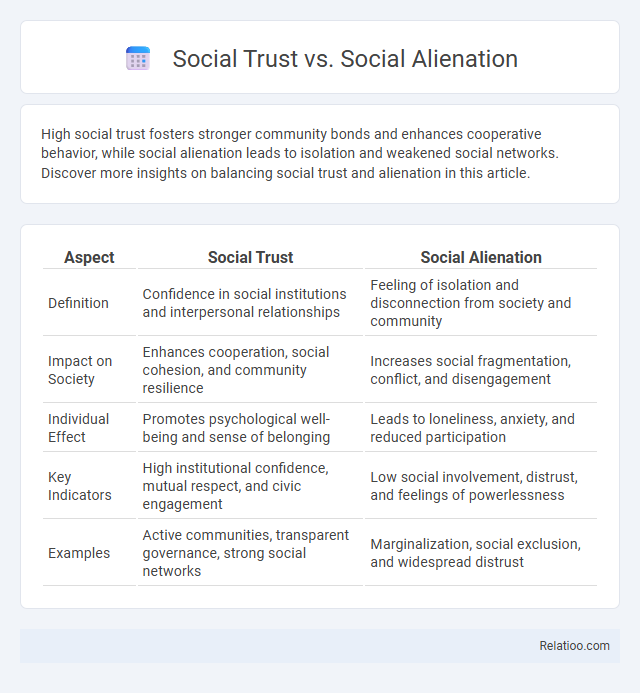High social trust fosters stronger community bonds and enhances cooperative behavior, while social alienation leads to isolation and weakened social networks. Discover more insights on balancing social trust and alienation in this article.
Table of Comparison
| Aspect | Social Trust | Social Alienation |
|---|---|---|
| Definition | Confidence in social institutions and interpersonal relationships | Feeling of isolation and disconnection from society and community |
| Impact on Society | Enhances cooperation, social cohesion, and community resilience | Increases social fragmentation, conflict, and disengagement |
| Individual Effect | Promotes psychological well-being and sense of belonging | Leads to loneliness, anxiety, and reduced participation |
| Key Indicators | High institutional confidence, mutual respect, and civic engagement | Low social involvement, distrust, and feelings of powerlessness |
| Examples | Active communities, transparent governance, strong social networks | Marginalization, social exclusion, and widespread distrust |
Understanding Social Trust: Definition and Importance
Social trust refers to the confidence individuals place in others and institutions within their community, fostering cooperation and social cohesion. You gain a sense of security and belonging when social trust is strong, reducing feelings of alienation that arise from social isolation or marginalization. Understanding social trust is essential for addressing social alienation and promoting healthier, more connected societies.
The Roots and Causes of Social Alienation
Social alienation arises from factors such as social isolation, lack of meaningful relationships, and systemic inequalities that erode trust within communities. The roots of social alienation often stem from economic disparities, cultural fragmentation, and feelings of powerlessness, contrasting sharply with social trust, which is built on mutual respect and shared values. Your understanding of these causes can help identify ways to foster stronger connections and reduce feelings of exclusion in society.
Historical Perspectives on Trust and Alienation
Historical perspectives reveal social trust as the foundation for cohesive societies, fostering cooperation and mutual respect, while social alienation emerges from feelings of powerlessness and disconnection in rapidly changing social structures. Alienation, often studied through Marxist and Durkheimian lenses, highlights the individual's estrangement from work, community, and self, reflecting broader socio-economic transformations. Your understanding of these dynamics is crucial for addressing contemporary social fragmentation and rebuilding trust in evolving social contexts.
Key Factors Influencing Social Trust
Key factors influencing social trust include shared values, reciprocal interactions, and consistent communication within communities, which foster a sense of belonging and cooperation. Social alienation arises when individuals feel isolated or disconnected due to lack of social support, perceived inequality, or cultural differences, undermining trust in relationships and institutions. Your ability to build social trust depends on nurturing inclusiveness, transparency, and empathy to counteract alienation and promote collective well-being.
Social Alienation in the Digital Age
Social alienation in the digital age intensifies feelings of isolation despite increased online connectivity, as individuals often experience diminished face-to-face interactions and lack authentic social bonds. Unlike social trust, which fosters community cohesion and mutual support, digital platforms can amplify social alienation by promoting superficial relationships and echo chambers that undermine genuine engagement. This divergence highlights the critical need to balance virtual communication with meaningful offline social experiences to counteract the psychological impacts of alienation.
Impacts of Social Trust on Communities
High social trust within communities fosters cooperation, reduces crime rates, and enhances collective well-being by promoting mutual support and shared norms. Low social trust can lead to social alienation, where individuals feel isolated and disengaged, weakening community bonds and increasing vulnerability to social fragmentation. Strengthening social trust is essential for resilient communities, enabling effective collaboration in addressing socio-economic challenges and improving overall quality of life.
Psychological Effects of Social Alienation
Social alienation can severely impact your mental health, leading to feelings of loneliness, depression, and decreased self-esteem due to a lack of meaningful social connections. Unlike social trust, which fosters a sense of belonging and psychological security, social alienation contributes to emotional isolation and cognitive distortions. Understanding the psychological effects of social alienation is crucial for developing interventions to improve mental well-being and social integration.
Rebuilding Social Trust in Fragmented Societies
Rebuilding social trust in fragmented societies requires addressing social alienation, which occurs when individuals feel disconnected from community norms and values. Social trust enables cooperation and collective well-being, while alienation undermines social cohesion and increases conflict risks. Your efforts to foster inclusive dialogue and shared experiences can bridge divides and restore trust in diverse social environments.
Strategies to Overcome Social Alienation
Social trust fosters community cohesion by encouraging open communication and shared values, whereas social alienation isolates individuals through feelings of disconnect and disempowerment. Strategies to overcome social alienation include building supportive social networks, promoting inclusive activities that engage diverse groups, and facilitating access to mental health resources. By actively participating in community initiatives, you can rebuild trust and reduce feelings of isolation, enhancing overall social well-being.
The Future of Social Trust and Alienation
Social trust influences community resilience and cooperation, while social alienation leads to disengagement and weakened social bonds. Your future interactions will increasingly depend on digital platforms shaping how trust is built or eroded. Understanding these dynamics is crucial as societal shifts redefine social connectivity and alienation patterns.

Infographic: Social Trust vs Social Alienation
 relatioo.com
relatioo.com